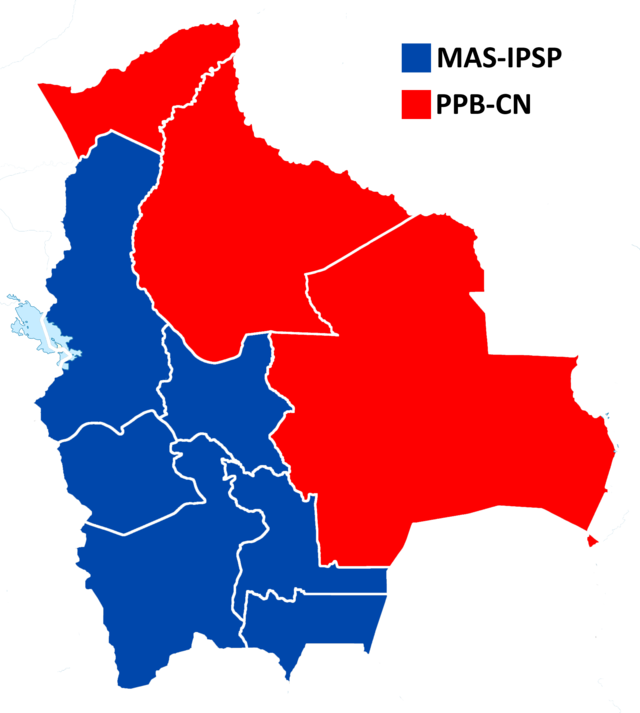2009 Bolivian general election
From Wikipedia, the free encyclopedia
General elections were held in Bolivia on December 6, 2009,[1] following a constitutional referendum held on 25 January 2009.[2][3] The election was initially expected to be held in 2010.[4] Voters elected:
- President and Vice President of the Republic.
- 130 members of the Chamber of Deputies.
- 36 members of the Senate.
| |||||||||||||||||||||||||
|
| |||||||||||||||||||||||||
Presidential election | |||||||||||||||||||||||||
| |||||||||||||||||||||||||
 Results by province | |||||||||||||||||||||||||
| |||||||||||||||||||||||||
The five departments which had not already done so all voted to have departmental autonomy. Eleven municipalities voted to have indigenous autonomy, out of twelve holding such referendums.[5] One province voted to have regional autonomy.
Presidential candidates
Under the new constitution, all previous terms will not be considered for term limits. If any candidate fails to win over 50% of the vote and another candidate is within 10%, a second round will be held. It was the first time that an incumbent president ran for reelection. The presidential candidates were:
- Evo Morales (Movement for Socialism): incumbent president, the first of indigenous identity. He is Aymara.
- Manfred Reyes Villa (Plan Progress for Bolivia – National Convergence): former prefect of the Cochabamba Department.
- René Joaquino (Social Alliance): Mayor of Potosí
- Samuel Doria Medina (Frente de Unidad Nacional)
- Alejo Véliz (Pueblos por la Libertad y Soberanía)
- Ana María Flores (Movimiento de Unidad Social Patriótica)
- Rime Choquehuanca (Bolivia Social Demócrata)
- Román Loayza (Gente)
Opinion polls
Polling prior to the election indicated that incumbent Evo Morales enjoyed a 55% approval rating, as well as an 18-point lead over his closest challenger Manfred Reyes Villa.[6] As Morales was expected to cruise to reelection, the local press reported that Villa has already purchased an airplane ticket to the United States for the 7th (the day after the election).[6]
Results

Departments where Morales won
Departments where Reyes won
Evo Morales won a convincing victory, with 64.22% of the vote. His party, Movement for Socialism, won a two-thirds majority in both the Chamber of Deputies and the Senate.
  | |||||||||
|---|---|---|---|---|---|---|---|---|---|
| Party | Presidential candidate | Votes | % | Seats | |||||
| Chamber | +/– | Senate | +/– | ||||||
| Movement for Socialism | Evo Morales | 2,943,209 | 64.22 | 88 | +16 | 26 | +14 | ||
| Plan Progress for Bolivia – National Convergence | Manfred Reyes Villa | 1,212,795 | 26.46 | 37 | +30 | 10 | +9 | ||
| National Unity Front | Samuel Doria Medina | 258,971 | 5.65 | 3 | –5 | 0 | –1 | ||
| Social Alliance | René Joaquino Carlos | 106,027 | 2.31 | 2 | New | 0 | New | ||
| Social Patriotic Unity Movement | Ana María Flores | 23,257 | 0.51 | 0 | New | 0 | New | ||
| Gente | Román Loayza | 15,627 | 0.34 | 0 | New | 0 | New | ||
| Peoples for Liberty and Sovereignty | Alejo Véliz | 12,995 | 0.28 | 0 | New | 0 | New | ||
| Social Democratic Bolivia | Rime Choquehuanca | 9,905 | 0.22 | 0 | New | 0 | New | ||
| Total | 4,582,786 | 100.00 | 130 | 0 | 36 | +9 | |||
| Valid votes | 4,582,786 | 94.31 | |||||||
| Invalid/blank votes | 276,654 | 5.69 | |||||||
| Total votes | 4,859,440 | 100.00 | |||||||
| Registered voters/turnout | 5,139,554 | 94.55 | |||||||
| Source: CNE | |||||||||
Autonomy referendums
Summarize
Perspective
Departments
The five departments which had not already done so all voted to become autonomous departments. Each will have to produce a statute of autonomy. They were:
- Chuquisaca Department—79% voting yes
- Cochabamba Department—76.8% voting yes
- La Paz Department—79.6% voting yes
- Oruro Department—73.1% voting yes
- Potosí Department—73.9% voting yes[7]
Regional autonomy
The Gran Chaco Province in Tarija held a referendum on regional autonomy, which was approved by 80.4% of voters.[8]
Municipalities
The following municipalities voted on whether to become autonomous municipalities according to the Indigenous Originary Campesino Autonomy provisions of the 2009 Constitution. Eleven voted yes:
- Huacaya Municipality (Chuquisaca Department) – 53.7% of voters in favor of autonomy[9]
- Tarabuco Municipality (Chuquisaca Department) – 90.8%
- Mojocoya Municipality (Chuquisaca Department) – 88.3%
- Charazani Municipality (La Paz Department) – 86.6%
- Jesús de Machaca Municipality (La Paz Department) – 56.1%
- Pampa Aullagas Municipality (Oruro Department) – 83.7%
- San Pedro de Totora Municipality (Oruro Department) -- 74.5%
- Chipaya Municipality (Oruro Department) -- 91.9%
- Salinas de Garci Mendoza Municipality (Oruro Department) -- 75.1%
- Chayanta Municipality (Potosí Department) – 60%
- Charagua Municipality (Santa Cruz Department) – 55.7%
One municipality voted no:
- Curahuara de Carangas Municipality[5]
References
Wikiwand - on
Seamless Wikipedia browsing. On steroids.



